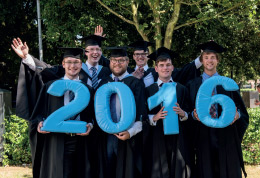
European Masters in Embedded Computing Systems
Develop a thorough understanding of some of the most important technologies that are transforming our communications systems.

This film provides insight into life as an MSc student at the Optoelectronics Research Centre. Photonics is a leading enabling technology of the 21st century. It impacts almost every area of our modern lives and our world would not be the same without it.

Develop a thorough understanding of some of the most important technologies that are transforming our communications systems.

Download an Electronics and Computer Science subject brochure or get a copy posted to you.
Get your subject brochure
Download an Electronics and Computer Science subject brochure or get a copy posted to you.
Get your subject brochure